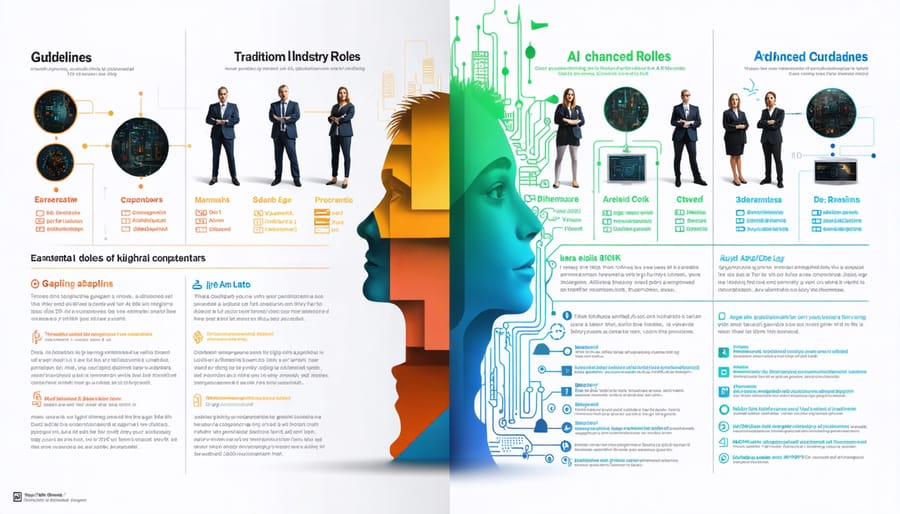Artificial Intelligence is revolutionizing business operations at an unprecedented pace, transforming everything from customer service to strategic decision-making. In 2024, companies that effectively integrate AI solutions are seeing up to 40% improvement in operational efficiency and a 35% increase in customer satisfaction rates. This technological shift isn’t just about automation – it’s fundamentally reshaping how businesses compete, innovate, and deliver value in the global marketplace.
The strategic implementation of AI technologies has become a critical differentiator between market leaders and followers. From predictive analytics that forecast market trends with 85% accuracy to AI-powered chatbots that handle customer inquiries 24/7, businesses are discovering new ways to leverage artificial intelligence to gain competitive advantages. Small startups to Fortune 500 companies are using AI to streamline processes, reduce costs, and create more personalized customer experiences.
For business leaders and professionals, understanding AI integration isn’t just an option – it’s an imperative for survival in today’s digital economy. Whether you’re a CEO planning digital transformation or a manager looking to optimize team performance, AI offers tools and solutions that can dramatically enhance your business capabilities and market position.

How AI Is Reshaping Traditional Business Roles
The Evolution of Decision-Making Positions
The integration of AI has fundamentally transformed how business leaders make decisions and approach strategic planning roles. Traditional management positions now require a hybrid skill set that combines human insight with AI-powered analytics. Managers are evolving from pure decision-makers to decision facilitators, using AI tools to analyze vast amounts of data and generate evidence-based recommendations.
Modern executives increasingly rely on AI-driven dashboards that provide real-time insights, predictive analytics, and scenario planning capabilities. These tools help leaders identify market trends, optimize resource allocation, and anticipate potential challenges before they arise. For instance, AI algorithms can now process years of historical data to forecast market demands, allowing managers to make more informed inventory and staffing decisions.
The role of middle management is also shifting, with AI handling routine tasks while humans focus on strategy, creativity, and relationship building. This evolution demands that leaders develop new competencies in AI literacy while maintaining their core leadership qualities of empathy, communication, and strategic thinking.
New Hybrid Roles Emerging
The business landscape is witnessing the emergence of innovative roles that bridge the gap between traditional business functions and AI technology. These hybrid positions combine domain expertise with AI capabilities, creating unique career opportunities for professionals willing to adapt.
For example, AI Product Managers now need to understand both market dynamics and machine learning capabilities to develop AI-powered solutions. Marketing Analytics Specialists combine traditional marketing principles with AI-driven data analysis to create more targeted campaigns. Similarly, HR Technology Consultants leverage AI tools for recruitment while maintaining the human touch in employee relations.
Business Process Automation Specialists are increasingly in demand, as they understand both operational workflows and how AI can optimize them. Financial Technology Analysts blend accounting expertise with AI-powered predictive modeling to enhance financial forecasting and risk assessment.
These roles typically require a mix of soft skills like communication and problem-solving, alongside technical knowledge of AI applications. Organizations are actively seeking professionals who can serve as bridges between technical teams and business stakeholders, making these hybrid positions both challenging and rewarding career paths.

Industry-Specific AI Applications
Manufacturing and Supply Chain
AI is revolutionizing manufacturing and supply chain operations through intelligent automation and predictive capabilities. Smart factories now employ AI-powered robots that adapt to changing production requirements and collaborate safely with human workers. These systems can detect quality issues in real-time, reducing defects and waste while maintaining consistent product standards.
In supply chain management, AI algorithms analyze vast amounts of data to optimize inventory levels, predict maintenance needs, and forecast demand with unprecedented accuracy. Machine learning models can anticipate supply chain disruptions before they occur, allowing businesses to take proactive measures and maintain operational continuity.
For example, manufacturers are using digital twins – virtual replicas of physical operations – to simulate and optimize production processes. AI-driven logistics systems calculate the most efficient delivery routes, considering factors like weather, traffic, and fuel consumption. This smart routing has led to significant reductions in delivery times and transportation costs.
The integration of IoT sensors with AI has enabled real-time tracking of goods and equipment, providing complete visibility across the supply chain. This transparency helps companies identify bottlenecks, reduce delays, and make data-driven decisions to improve overall efficiency.
Financial Services
The financial services sector has emerged as a prime beneficiary of AI integration, revolutionizing how banks and financial institutions operate. In risk assessment, AI algorithms analyze vast amounts of data to evaluate creditworthiness more accurately than traditional methods, leading to faster loan approvals and reduced default rates.
Fraud detection has become significantly more sophisticated with AI-powered systems monitoring transactions in real-time. These systems can identify suspicious patterns and anomalies that might escape human observation, protecting both institutions and customers from financial fraud. For instance, major banks report up to 50% reduction in false fraud alerts since implementing AI detection systems.
In trading, AI has transformed the landscape through automated systems that can analyze market trends, news sentiment, and historical data simultaneously. These algorithms execute trades at speeds impossible for human traders, while maintaining strict risk management protocols. Robo-advisors, powered by AI, now manage investment portfolios for millions of clients, offering personalized financial advice at a fraction of traditional costs.
The implementation of chatbots and virtual assistants in banking has also improved customer service, handling routine queries and transactions 24/7, while reducing operational costs significantly.
Healthcare and Biotech
AI is revolutionizing healthcare and biotech industries by enhancing diagnostic accuracy, accelerating drug development, and improving patient care delivery. Machine learning algorithms now analyze medical images with remarkable precision, helping doctors detect diseases like cancer at earlier stages. These AI systems can identify subtle patterns in X-rays, MRIs, and CT scans that might escape the human eye.
In drug discovery, AI significantly reduces the time and cost of developing new medications. By analyzing vast databases of molecular structures and biological interactions, AI systems can predict which compounds are most likely to be effective treatments, cutting years off traditional research timelines. Companies like DeepMind have already demonstrated AI’s ability to predict protein structures, a breakthrough that could accelerate drug development dramatically.
Patient care has also been transformed through AI-powered monitoring systems and predictive analytics. Smart devices track vital signs and alert healthcare providers to potential issues before they become critical. Virtual nursing assistants help manage routine patient interactions, while AI-driven scheduling systems optimize hospital resources and reduce wait times. These innovations not only improve healthcare outcomes but also make quality care more accessible and cost-effective for patients worldwide.
Retail and E-commerce
AI has revolutionized the retail and e-commerce landscape, transforming how businesses interact with customers and manage operations. In customer service, AI-powered chatbots and virtual assistants now handle routine inquiries 24/7, providing instant responses to common questions about orders, returns, and product information. These systems learn from each interaction, continuously improving their ability to assist customers effectively.
Smart inventory management systems use AI algorithms to predict demand patterns, optimize stock levels, and prevent stockouts or overstock situations. By analyzing historical sales data, seasonal trends, and external factors like weather or local events, businesses can make data-driven decisions about inventory procurement and distribution.
Personalization has become a cornerstone of modern retail success, with AI analyzing customer behavior, purchase history, and browsing patterns to create tailored shopping experiences. This includes personalized product recommendations, customized email marketing campaigns, and dynamic pricing strategies. Major retailers are using AI to create virtual try-on experiences, size recommendations, and custom product suggestions, significantly improving conversion rates and customer satisfaction.
These AI implementations not only enhance operational efficiency but also create more engaging and convenient shopping experiences for customers while reducing operational costs for businesses.

Essential Skills for AI-Driven Careers
Technical Foundation Requirements
To effectively integrate AI systems into business operations, organizations need a solid technical foundation. The essential requirements begin with robust data infrastructure, including secure databases, data warehousing solutions, and reliable cloud computing capabilities. Team members should possess basic programming knowledge, particularly in languages commonly used in AI development such as Python or R.
Understanding of data analytics and statistical concepts is crucial, as these form the backbone of AI systems. This includes familiarity with data preprocessing techniques, feature engineering, and basic machine learning concepts. While not everyone needs to be a data scientist, having team members who can interpret AI outputs and understand the underlying logic is invaluable.
API integration knowledge is another vital requirement, as most modern AI solutions interface with existing business systems through APIs. Teams should be comfortable with REST APIs and basic web services concepts to ensure smooth integration of AI tools with current business applications.
Cybersecurity awareness is non-negotiable, as AI systems often handle sensitive business data. Teams need to understand basic security protocols, data privacy requirements, and compliance standards relevant to their industry.
Additionally, version control systems like Git and project management tools are essential for tracking changes and maintaining AI implementations. While these technical requirements might seem daunting, they can be developed gradually through training programs and hands-on experience with AI tools.
Soft Skills in the AI Era
In today’s rapidly evolving business landscape, technical prowess alone isn’t enough to thrive in AI-integrated environments. The most successful professionals combine technical knowledge with crucial essential skills for AI-integrated workplaces that enable them to bridge the gap between human intelligence and artificial intelligence.
Critical thinking and problem-solving abilities have become more valuable than ever, as professionals need to interpret AI-generated insights and make strategic decisions that machines cannot. Emotional intelligence and interpersonal skills are equally important, allowing teams to effectively collaborate with both human colleagues and AI systems.
Adaptability and continuous learning stand out as fundamental traits, given the rapid pace of AI advancement. Professionals must remain flexible and open to changing workflows, processes, and tools. Communication skills have evolved to include the ability to translate complex AI concepts into actionable insights for stakeholders at all levels.
Leadership in the AI era requires a unique blend of vision and practical understanding. Managers must guide their teams through technological transitions while maintaining empathy and fostering innovation. Cultural awareness and ethical decision-making are crucial as AI systems become more prevalent in global business operations.
The ability to think creatively and identify opportunities for AI implementation, while understanding its limitations, has become an invaluable skill set. These soft skills complement technical knowledge and create well-rounded professionals who can drive successful AI integration initiatives.
Practical Steps for Career Advancement
Building Your AI Expertise
Building AI expertise starts with developing AI-related skills through structured learning paths. Begin with online platforms like Coursera, edX, and Udacity, which offer comprehensive AI and machine learning courses from leading institutions. These platforms provide both theoretical foundations and hands-on practice with popular AI tools and frameworks.
Consider joining AI communities and forums where you can learn from experienced practitioners and stay updated with industry trends. Platforms like GitHub and Kaggle offer practical projects and competitions to apply your knowledge in real-world scenarios.
For business professionals, focus on understanding AI applications specific to your industry. Start with basic concepts like data analytics and machine learning fundamentals, then progress to more specialized areas like natural language processing or computer vision based on your business needs.
Practical experience is crucial. Begin with small projects implementing AI solutions in your current role, even if they’re simple automation tasks. Document your learning journey and build a portfolio of AI projects that demonstrate your growing expertise to potential employers or clients.
Positioning Yourself for AI Opportunities
To position yourself for success in AI-related roles, start by identifying your current skillset and how it aligns with AI requirements. Focus on developing a strong foundation in data analysis, problem-solving, and basic programming concepts. Many professionals successfully transition into AI careers by combining their industry expertise with newly acquired technical skills.
Consider pursuing certifications in machine learning, data science, or specific AI platforms that are relevant to your target industry. Popular options include AWS Machine Learning certification or Google’s AI certification programs. These credentials demonstrate your commitment and technical competency to potential employers.
Network actively within AI communities, attend industry conferences, and join online forums where AI professionals gather. This exposure helps you understand current trends and creates opportunities for mentorship and job referrals.
Start small by identifying AI implementation opportunities within your current role. Propose and lead AI-related projects, even if they’re modest in scope. This hands-on experience proves invaluable when seeking more advanced positions in AI integration.
Create a portfolio showcasing your AI projects and contributions, emphasizing business impact and problem-solving abilities rather than just technical specifications.
As we look ahead, the integration of AI in business is not just a trend but a fundamental shift in how organizations operate and compete. The successful implementation of AI technologies has become a key differentiator for businesses across all sectors, from streamlining operations to enhancing customer experiences and driving innovation.
Key takeaways from our exploration reveal that businesses embracing AI are seeing significant improvements in efficiency, decision-making capabilities, and competitive advantage. The combination of machine learning, natural language processing, and automation continues to unlock new possibilities for organizations willing to invest in these technologies.
Looking toward the future, we can expect AI integration to become even more sophisticated and accessible. Small businesses will have greater access to AI tools, while enterprise-level organizations will push the boundaries of what’s possible with advanced AI applications. The democratization of AI technology means that businesses of all sizes can benefit from its transformative power.
However, successful AI integration requires a balanced approach. Organizations must focus on building the right infrastructure, developing talent, and maintaining ethical guidelines while implementing AI solutions. The human element remains crucial, with AI serving as a powerful tool to augment human capabilities rather than replace them entirely.
As we move forward, businesses that adapt to this AI-driven landscape while maintaining a focus on human-centric values will be best positioned for success in the evolving digital economy.

